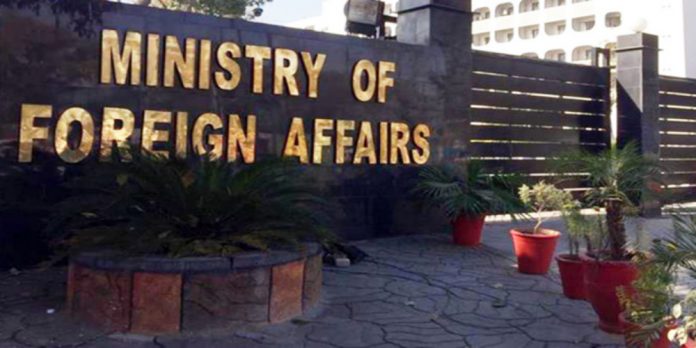By Our Diplomatic Correspondent
ISLAMABAD: The Foreign Office (FO) on Friday termed the joint US-India statement — issued against Pakistan after Indian Prime Minister Narendra Modi met President Joe Biden a day earlier — “misleading and unwarranted”, saying that the “reference is contrary to diplomatic norms and has political overtones”.
Biden laid out a red carpet for Modi, who is on a trip to the US, at the White House on Thursday where the two countries sealed major defence and technology deals as Washington bets big on India as a counterweight to China.
In an apparent bid to use the visit to further India’s agenda against Islamabad, a joint statement issued by the two heads of state late on Thursday called on Pakistan to crack down on extremists that target New Delhi.
The statement called for action against extremist groups based in Pakistan such as the banned Lashkar-e-Taiba and Jaish-e-Mohammad.
Responding to media queries regarding the statement today, the FO Spokesperson Mumtaz Zahra Baloch said: “We consider the Pakistan-specific reference in the ‘Joint Statement from the United States and India’, issued on 22 June 2023, as unwarranted, one-sided, and misleading.
“The reference is contrary to diplomatic norms and has political overtones. We are surprised that it has been added despite Pakistan’s close counterterrorism cooperation with the US.”
She recalled that Pakistan had rendered unmatched sacrifices in the fight against terrorism and in doing so the law enforcement agencies and armed forces had set an example.
“The people of Pakistan are the real heroes in this fight,” the FO spokesperson highlighted, adding that the international community had time and again recognised Pakistan’s efforts and sacrifices in the fight against terrorism.
“It has long concluded that terrorism can be defeated through concerted and cooperative actions.
“Today, we fail to see how the assertions made in the joint statement could strengthen the international resolve to fight terrorism. The statement shows that the cooperative spirit, so vitally needed to defeat the scourge of terrorism, has been sacrificed at the altar of geopolitical considerations,” she said.
Zahra noted, “India, in addition to being a state-sponsor of terrorism, habitually uses terrorism bogey to deflect attention from its brutal repression of Kashmiri people in Indian Illegally Occupied Jammu and Kashmir, and maltreatment of its minorities.”
“It is thus completely ill-placed to cast any aspersions on Pakistan and its fight against terrorism.
“Ironically, the joint statement fails to address the key sources of tension and instability in the region and to take cognisance of the grave human rights situation in the Indian Illegally Occupied Jammu & Kashmir (IIOJK). This is tantamount to abdication of international responsibility,” the spokesperson pointed out.
She added that Pakistan was deeply concerned over “the planned transfer of advanced military technologies to India”, saying that such steps “are accentuating military imbalance in the region and undermining strategic stability”.
They remain unhelpful in achieving the objective of durable peace in South Asia, Zahra said.
“We urge our international partners to take a holistic and objective view of the issues of peace and security in South Asia and refrain from endorsing one-sided positions,” she added.




